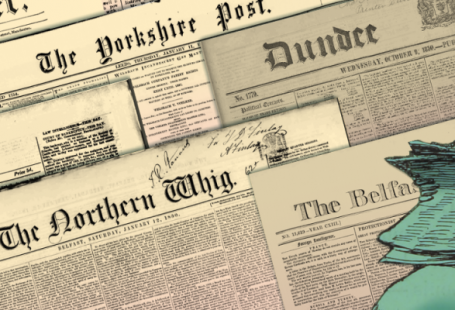
The British Newspaper Archive brings you news from India, China, and further East during the height of the British Empire. The Homeward Mail from India, China and the East was first published in 1857 by Messrs. Smith, Elder, & Co. and provided Britain with news from its colonies in the East. The publishing company also produced the first Dictionary of National Biography and worked with major authors such as Charlotte Brontë, George Eliot, Alfred Tennyson, and Arthur Conan Doyle. Along with The Homeward Mail, they published The Overland Mail, a newspaper for people living in the East featuring news of Britain and Europe.
A predominate part of The Homeward Mail focused on news from India, the crown in the British imperial crown. Each edition displayed a table of content on the front page. The news was organised by the three Indian presidencies – Bengal, Bombay, and Madras – and then news from China. At the time of publication, India also included parts of present-day Pakistan, Bangladesh, Aden, and Burma.

Every edition usually ran between 30 and 40 pages in length and carried news of appointments, military orders, commercial and shipping intelligence, and the latest in political news. In the early years, The Homeward Mail was published every two weeks, and then by 1857, it was published weekly. In 1907, the paper amalgamated with Allen’s Indian Mail and expanded its readership.
The first edition was published on 1 January 1857, only months before the beginning of the Indian Mutiny, also known as the Sepoy Mutiny or India’s First War of Independence. The conflict was reported by The Homeward Mail as the revolt of the Indian Army. On 13 November 1858, the details of a letter inciting rebellion from the King of Delhi, Bahadur Shah II, the last Mughal emperor, was published. It laid out numerous grievances felt by natives against the British government, such as, ‘the fixed tax they pay to the British Government is exorbitant, they are insulted and ruined by the constant sales of their estates for unpaid revenues’. To public servants, the King declared, ‘under the British Government they had little respect, low pay, and no manner of influence’. The King also explained that artisans were ruined after the introduction of British fabrics.

The widespread uprising was a turning point in Indian history, leading to the dissolution of the East India Company. After 1858, India was ruled directly by the British crown. Britain continued to rule India until 1947.
Another feature of the paper was to publish the names of passengers who arrived back in England and list births, marriages, and deaths. Notable names received a full obituary. For example, on Monday 17 June 1912, The Homeward Mail reported, ‘Dr. Selwyn, B.A., M.B., of Hyderabad (Sind) died at the Central Hotel, Kurrachee, on May 29. She underwent an operation at Hyderabad on the 13th, and as there was no improvement in her condition she was brought to Kurrachee on the 27th. She practised as a lady doctor in Hyderabad, and did much charitable work there, where she had a wide practice among the more notable zemindari families’.

State dinners were extensively covered, including the names of all those who attended. The paper commented on society news and followed the happenings of the aristocracy. On 4 January 1908, a commentary on a society event with both English and Indian women was published.
‘An Indian lady writes: A very enjoyable purdah party was held a day or two ago in Lady Stanley’s drawing-room. Considering that the meeting was the first of its kind in Allahabad, the number of its high-class Indian ladies present was appreciable. There were some English ladies also, among those present being Lady Burkitt, Lady Know,Mrs Aikman, andMrs Richards. The object of the meeting held at Lady Stanley’s was to promote social intercourse and genuine sympathy between England and Indian ladies’.

Let us know what you find while exploring The Homeward Mail from India, China and the East.




